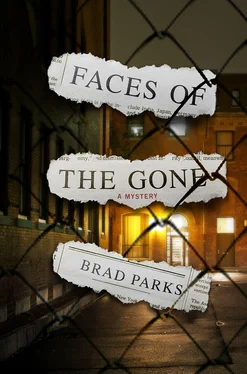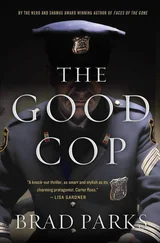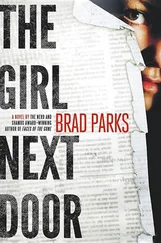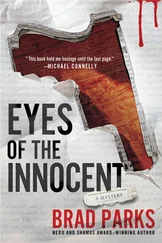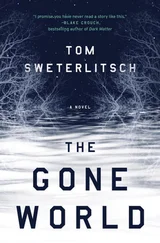Brad Parks - Faces of the Gone
Здесь есть возможность читать онлайн «Brad Parks - Faces of the Gone» весь текст электронной книги совершенно бесплатно (целиком полную версию без сокращений). В некоторых случаях можно слушать аудио, скачать через торрент в формате fb2 и присутствует краткое содержание. Год выпуска: 2010, ISBN: 2010, Издательство: Minotaur Books, Жанр: Триллер, на английском языке. Описание произведения, (предисловие) а так же отзывы посетителей доступны на портале библиотеки ЛибКат.
- Название:Faces of the Gone
- Автор:
- Издательство:Minotaur Books
- Жанр:
- Год:2010
- ISBN:9780312574772
- Рейтинг книги:3 / 5. Голосов: 1
-
Избранное:Добавить в избранное
- Отзывы:
-
Ваша оценка:
- 60
- 1
- 2
- 3
- 4
- 5
Faces of the Gone: краткое содержание, описание и аннотация
Предлагаем к чтению аннотацию, описание, краткое содержание или предисловие (зависит от того, что написал сам автор книги «Faces of the Gone»). Если вы не нашли необходимую информацию о книге — напишите в комментариях, мы постараемся отыскать её.
Faces of the Gone — читать онлайн бесплатно полную книгу (весь текст) целиком
Ниже представлен текст книги, разбитый по страницам. Система сохранения места последней прочитанной страницы, позволяет с удобством читать онлайн бесплатно книгу «Faces of the Gone», без необходимости каждый раз заново искать на чём Вы остановились. Поставьте закладку, и сможете в любой момент перейти на страницу, на которой закончили чтение.
Интервал:
Закладка:
“Yeah, maybe I’ll do that,” I said as I departed his office.
“Tk Hrrrndzzz,” Szanto hollered after me.
“Hear that?” I asked Tommy Hernandez, the aforementioned Facebook-obsessed intern.
“Yeah, it sounds like a lawnmower that won’t start,” he said, then looked at me with something far beyond disdain.
“How many times do I have to tell you that a wristwatch is an accessory and it should match your belt?” he demanded.
Tommy is only twenty-two, but he’s blessed with a great reporter’s instinct of noticing every small detail. He’s handy to have on the streets, because he’s second-generation Cuban-American and speaks flawless Spanish. He’s also gay as the Mardi Gras parade.
“Come on, Tommy,” I said. “Let’s go embrace another beautiful day in Newark.”
The abandoned lot on Ludlow Street was, true to Peterson’s imagination, a sorrowful little patch of earth covered in dried weeds. The neighborhood around it wasn’t bad, by Newark standards. Most of the houses appeared to be owner occupied and decently maintained, with either newish siding or fresh paint. The church, St. Mary’s Catholic, was a century-old stone building with a tidy rectory next door. There was public housing across the street, but they were newly constructed town houses, the kind that wouldn’t go to seed for at least another decade. Weequahic Golf Course, a charming little cow pasture county residents could play for fifteen bucks, was maybe two blocks down the street.
“This place is pretty decent,” I said as Tommy and I pulled to a stop on Ludlow. He cast me a sideways glance.
“Yeah, let’s start an upscale day spa here,” he cracked.
“Okay, fair point,” I corrected myself. “But look around. There’s no one just hanging out. The cars are all gone. The people in this neighborhood work during the day.”
“How far are we from Seth Boyden?”
The Seth Boyden projects were a festering den of urban despair. Even the toughest reporters got jittery about going there during the day. Going there after dark put you on the short list for a mugging.
“Three or four blocks,” I said.
“Think it could have been someone from there? A lot of Blood sets hanging around.”
“Could be. But would some Blood really go through the trouble of marching four people all the way down here? Those guys are hit-and-run types.”
Tommy, who had written up nearly every shooting in Newark over the past six months, knew that as well as I did. We were really just stalling. The car was being buffeted by gusts of wind and neither of us was real keen to face them. A cold front had barreled down from Canada overnight and the winter season was giving New Jersey its first slap. Which figured. It’s a meteorological fact that as soon as the weather gets extreme-in either direction-it coincides with me having to do manon-the-street reporting. I’ve spent most of my career either sweating or shivering.
“I don’t suppose the story will come to us in here, will it?” I asked.
“You know, for a superstar investigative reporter, you’re a real pussy sometimes,” Tommy said.
Grunting, I willed myself out of the car, across the street, and into the vacant lot. The Newark police’s Crime Scene Unit had already retreated back to the warmth of their precinct. A few strips of windblown yellow tape were the only sign they had ever been there.
I gingerly picked my way toward the fence that lined the back of the lot, where a makeshift shrine was already forming. In the past few years, these shrines had become a ubiquitous part of the city landscape. As soon as some way-too-young kid gets gunned down, his boys come with candles and other mementos to memorialize the spot where he fell. If the victim is a Blood, you’ll see red bandanas and “BIP”-Blood in Peace-spray-painted somewhere nearby. If he’s a Crip, the bandanas will be blue and the graffiti will have some kind of number (Crip sets often have numbers). The Latin Kings decorate in black and gold, and so on.
I had interviewed kids who bragged about how big their shrines would be when they got killed. They talked about it with a nonchalance that was chilling.
This shrine was small, so far. But it would undoubtedly grow over the next few days. Four bouquets of flowers, one for each victim, had already been attached to the fence. One of the bouquets had a card attached. I turned it over to read the inscription.
“Wanda,” it read. “May you rest in peace forever. Love, Tynesha.”
Tommy had walked up behind me. As I stared dumbly, Tommy was scribbling something in his pad.
“Let’s find out who Tynesha is,” he said as he copied the name of the florist.
“Good plan,” I said, slightly chagrined the intern thought of it before I did.
“Someone’s gotta do your work for you,” he shot back.
Richard Whitlow approached us from the sidewalk, stepping carefully through the waist-high weeds. A beefy, dark-skinned black guy, he had been covering Newark for more than a decade and was, how to put it, a little bit inured to violent death. His greeted us with, “Hey, make sure you don’t slip on the blood puddle.”
“You journalists are so insensitive with your gallows humor,” I joked back.
“I wish I was kidding. Check it out,” he said, pointing to a bare patch of dirt that, sure enough, appeared to have been stained by something dark and red.
“Oh, nasty,” Tommy said.
“Yeah, poor suckers bled out right there,” Whitlow said, shaking his head.
“Police told you anything new?” I asked.
“Finally got the names out of them.”
“They mean anything to you?”
“Nah. Not until I figure out their street names,” Whitlow said. Aliases littered the hood like so much trash, especially among those who were employed in what you might call the city’s informal economy. Your friendly neighborhood drug dealer could be known by up to a half-dozen different aliases, which bore scant resemblance to his real name. Depending on the name the police settled on, the victim’s own mother might not recognize it. Or she might be the only one who recognized it.
“What names did they give you?”
Whitlow flipped open his notebook and shoved the page toward me so I could copy them down: Wanda Bass, Tyrone Scott, Shareef Thomas, Devin Whitehead. I had to press hard on my pen. The ink was already freezing.
“Cops say anything else?”
“Around ten, there were four shots, bang, bang, bang, bang,” Whitlow said, turning to the next page in his notebook. “No one called the cops or even thought much of it because there’s a bar down the street and people are always coming out drunk, shooting off their guns for the hell of it.”
I always found strange comfort that the American propensity for mixing alcohol and firearms cut across racial, socioeconomic, and cultural divides, from rural redneck to ghetto gangbanger to skeet-shooting blue blood.
“Around eleven, some guy came out of the bar and happened to see four people lying in the back of the lot,” Whitlow continued, flipping more pages as he went. “He told the cops he thought they were homeless and he was going to roust them and take them to a shelter, on account of the cold. Then he got close, saw the blood, and made the call.”
“Wow, there are helpful citizens after all,” I interjected.
“Yeah, anyway, that’s about all I can tell you, other than that my ass is about to freeze off,” Whitlow said, storing his notepad back in his jacket. “I got enough to write a daily. Hays is working some of his cop sources trying to get stuff out of them. Let me know if you find anything interesting around here.”
Tommy and I decided to work the streets, which can be a wonderful source of information for the reporter who doesn’t mind the trial-and-error method of walking up to random people until you bump into one who knows something.
Читать дальшеИнтервал:
Закладка:
Похожие книги на «Faces of the Gone»
Представляем Вашему вниманию похожие книги на «Faces of the Gone» списком для выбора. Мы отобрали схожую по названию и смыслу литературу в надежде предоставить читателям больше вариантов отыскать новые, интересные, ещё непрочитанные произведения.
Обсуждение, отзывы о книге «Faces of the Gone» и просто собственные мнения читателей. Оставьте ваши комментарии, напишите, что Вы думаете о произведении, его смысле или главных героях. Укажите что конкретно понравилось, а что нет, и почему Вы так считаете.
